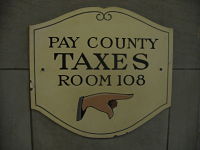Increasing Finances Through Unclaimed Cash
 The journey to financial stability is, nowadays, a roller coaster with more downs than ups. Because of the continuing global recession, many people have found it nearly impossible to keep their personal finances intact. This is especially true for average wage employees and low-income families. Nonetheless, there are ways to increase finances that remain covert and unexplored by many people, one of which is performing a search for unclaimed cash.
The journey to financial stability is, nowadays, a roller coaster with more downs than ups. Because of the continuing global recession, many people have found it nearly impossible to keep their personal finances intact. This is especially true for average wage employees and low-income families. Nonetheless, there are ways to increase finances that remain covert and unexplored by many people, one of which is performing a search for unclaimed cash.
Despite people’s keen eye for keeping personal finances close, there are several situations or occurrences where they leave some money somewhere. If gathered accordingly, these infinitesimal amounts can turn into one large sum of money. Such cases are known as unclaimed cash. But what exactly is it? How do people leave their money? And where can you search for unclaimed cash?
What is Unclaimed Cash
As the name implies, unclaimed cash is an amount that is not yet claimed by its rightful owner. But it is not only cash that is left unclaimed, properties and assets may also be unclaimed. These abandoned and forgotten assets are owed to either an individual or a company. The asset is announced unclaimed when no contact to its owner or beneficiary is established for a set period of time, typically within one to three years.
When the holder’s measures to locate the owner fail, the money or property is surrendered to the Department of Revenue, who is then responsible for protecting the finances. From thereon, the Department of Revenue will also be responsible for making further efforts to contact the owner through publicizing names of the property or cash owners. If a legitimate owner comes forward, they are to return the cash or property immediately.
There are many understandable reasons for unclaimed money and property. One common reason is relocation. For example, an individual who files an income tax return then relocates and changes their official address. Without provision of this information to the IRS, the income tax refund cannot be sent to its appropriate recipient. If the IRS attempts to send it, the mail may be lost to the old address of the recipient.
Forgetfulness and unawareness are also key reasons for unclaimed assets. For example, people of old age who are classified as veterans are eligible for veteran benefits. Unfortunately, they are unaware of this matter or has forgotten it over time. Those who are still active in public service may be given veteran benefits that haven’t been claimed yet. If the veteran is deceased, a family member or relative can claim it. Veteran benefits offer a great deal of financial support. It commonly features health and life insurance coverage, employment and educational advantages, disability benefits, etc.
Forms of Unclaimed Asset
• Unclaimed payroll from your previous job
• Overdue merchant checks
• Matured deposit certificates
• Old savings or checking accounts
• Unliquidated dividends
• Unclaimed securities
• Debt principals
• Security deposits that were not returned nor used
• Escrow balances
• Unliquidated cash orders, cashier checks, etc.
• Gift certificates
How to Locate Unclaimed Assets
You can indeed increase finances with unclaimed cash. Yet the question is, how will you find unclaimed assets? Finding an unclaimed asset is quite easy and simple, given the fact that people can access a range of search tools and programs for state-specific results. Nevertheless, it pays to be well knowledgeable and prepared. Here are tips and tricks to increase finances with unclaimed cash.
• Prepare a list of all feasible names where your cash may be registered under. This is especially important if you are claiming for proceeds of an insurance policy left by a family member after his/her death.
• Determine all locations you could have left unclaimed assets in. If you’ve moved several times now, prepare a list of areas where you resided or worked in. This will allow you to maximize the amount of unclaimed cash or property you get from your search. Searching throughout different states will enable you to recover assets that relatives may have appointed to you in which you were not aware of.

